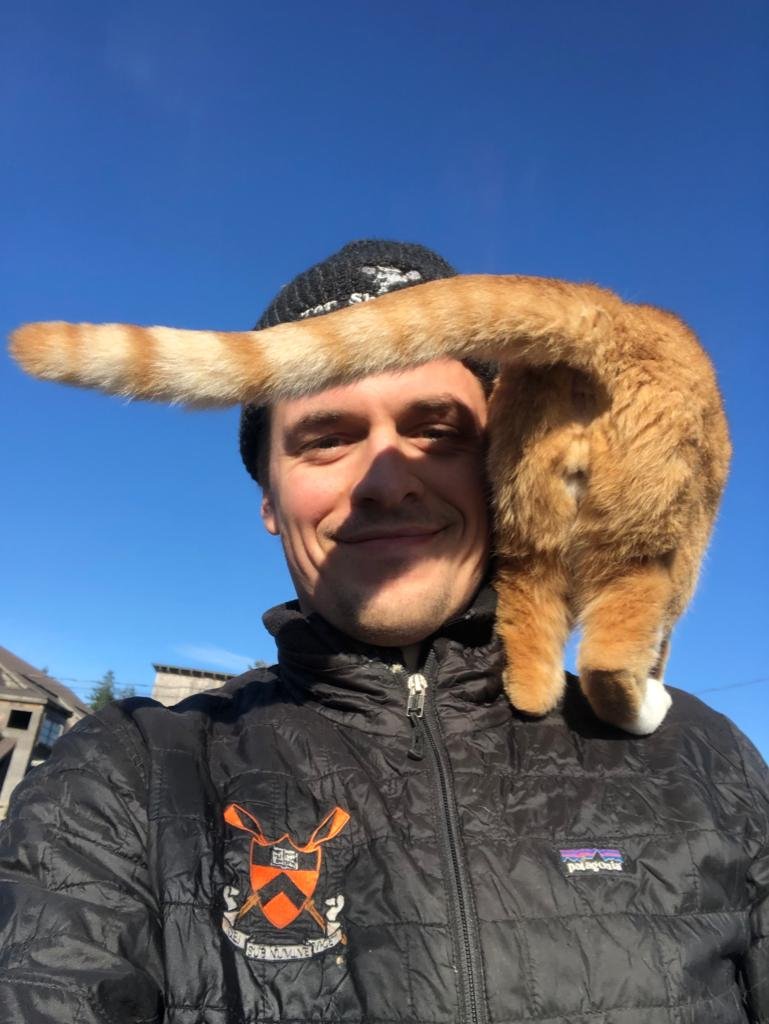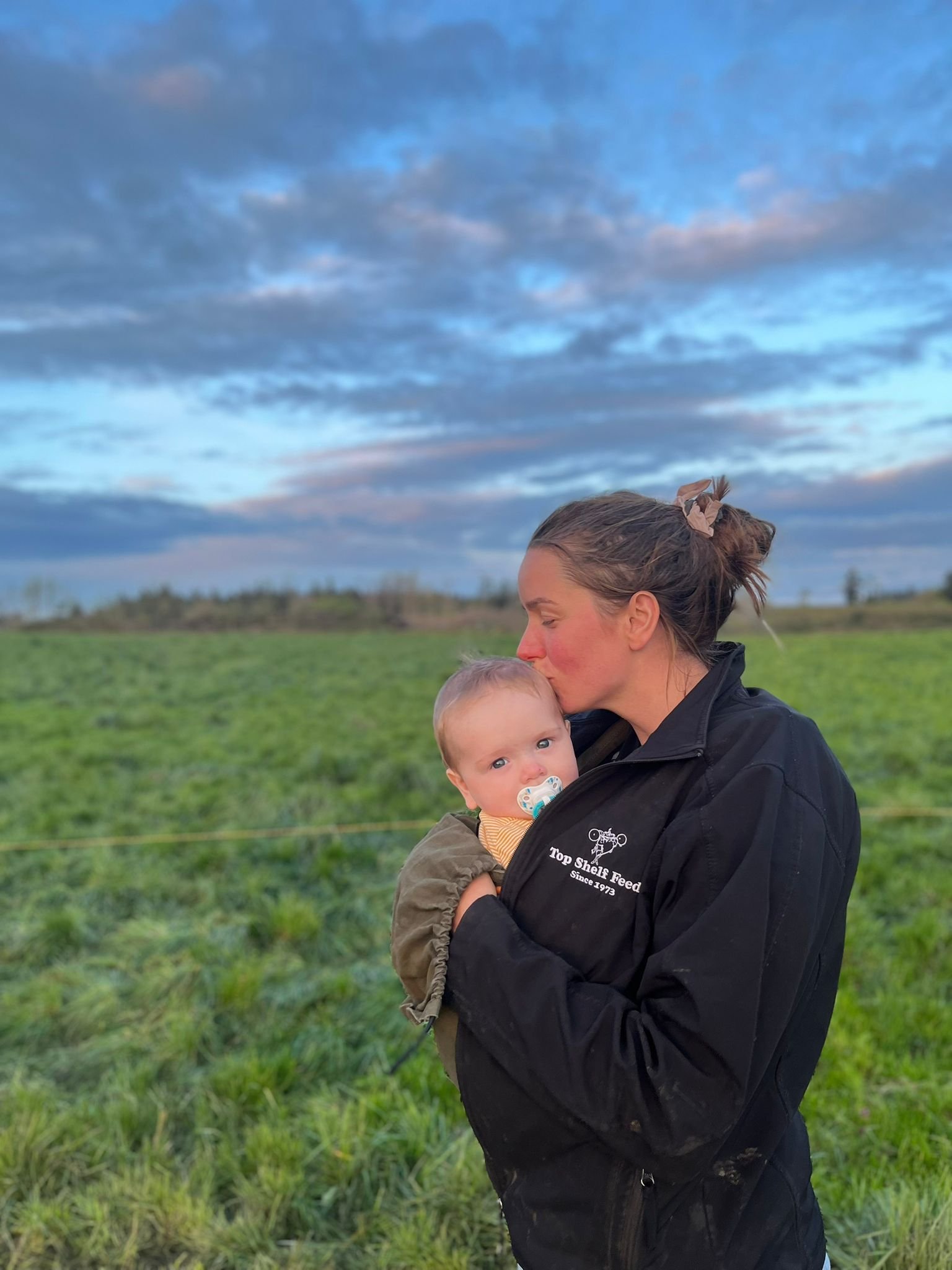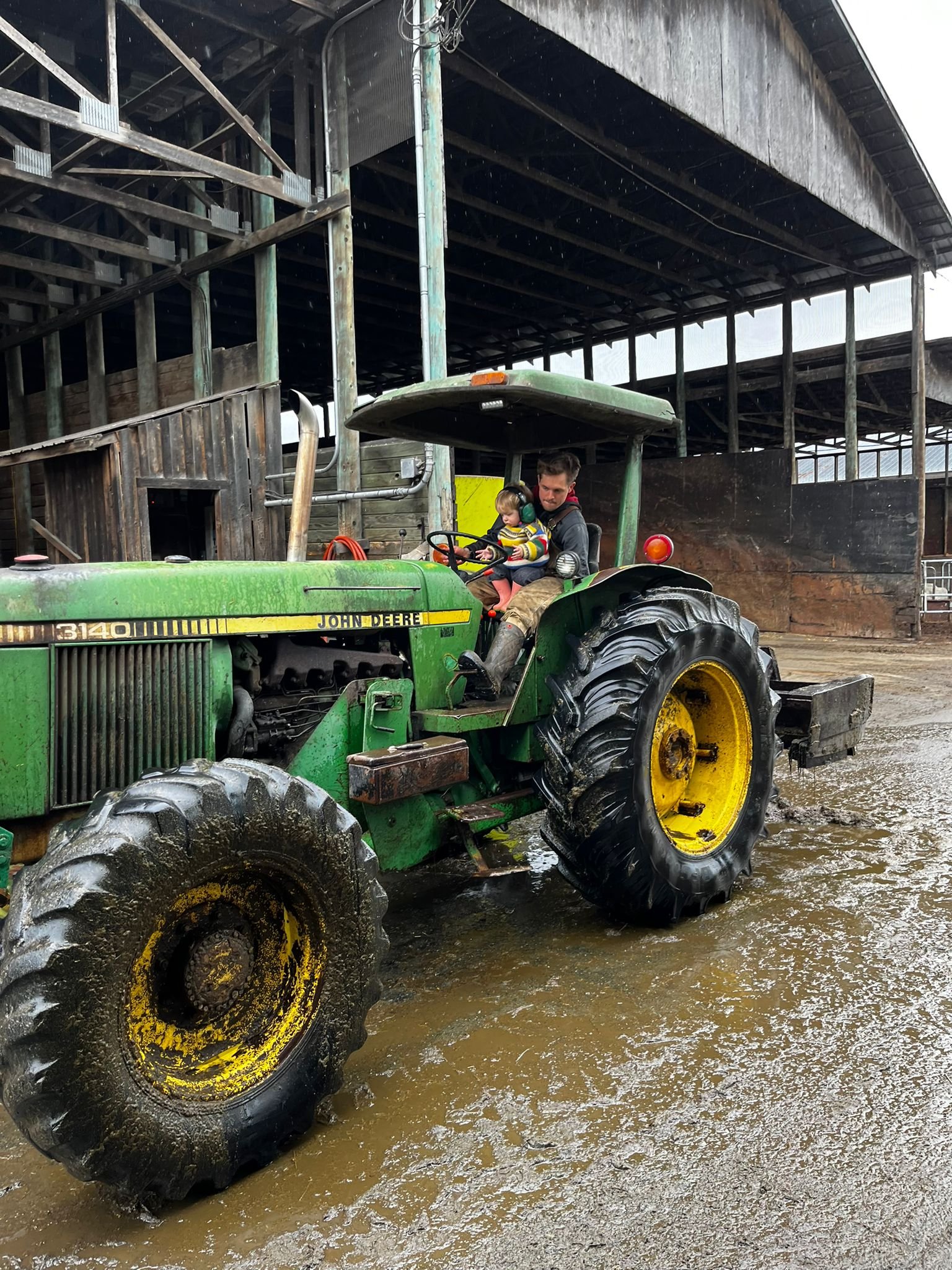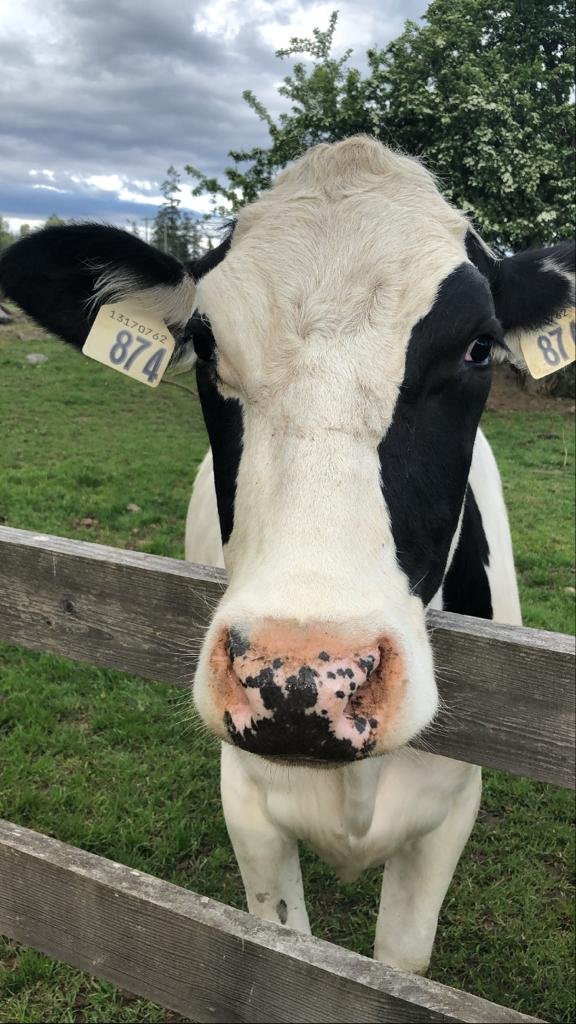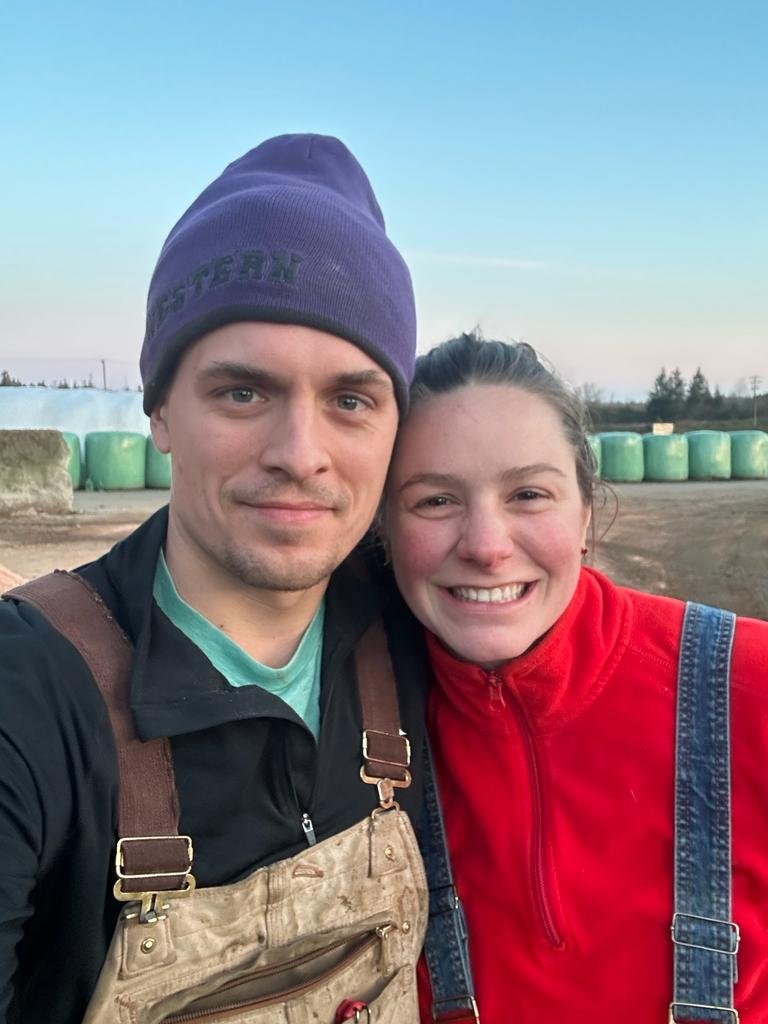From Finance to Farming: Reflecting on Unconventional Career Paths
In February, my brother became a dairy farmer. After seven years in finance, he left his stable, well-paying job in favour of something ‘udderly’ different (I’m sorry, I can’t help myself when it comes to puns and that was just too easy). He gave up his ‘sure thing’ career for something less certain, less familiar, and less glamorous. And for him, the change was easy because it meant supporting and working alongside his wife, Mickey, the most important person in his life.
I’ve spent much of my adult life grappling with ‘what I want to do’, so I found Angus’s shift both inspiring and thought-provoking. His move has provided me with some solace. It seems career trajectories don’t have to be linear.
Angus and I don’t speak on the phone all that often. He’s a busy guy – two young kids: Campbell, 18 months, and George, 2 months, a wife, two dogs, a new job, and a heck of a lot of cows. Instead, he and our other brother, Angus’s twin Liam and I share memes on Instagram. It’s more or less a meme tennis match – funny videos and pictures served and returned. Generally, no words are exchanged, unless something is particularly hilarious, but this week, Angus and I chatted on the phone about his recent career shift.
He spoke to me after a full day’s work in the fields. I could hear birds chirping and cows mooing in the background as he stood outside the barn and talked about the motivations and implications of this change. Angus is four years younger than I am and, growing up, I certainly didn’t picture him as a farmer. I wasn’t sure what he’d become, and it turns out, he didn’t know either. “I had no idea what I was going to do when I graduated high school. I thought, I guess I’ll go to business school and the University of British Columbia has a good business school.” When he graduated with a bachelor of commerce from UBC’s Sauder School of Business, he still wasn’t sure what to do for work, though, he admits he was motivated to find something “worthy of [his] post-secondary education.” Finance it was.
Angus’s wife Mickey always wanted to follow in her dad’s farming footsteps. Recently, Angus and she unearthed Mickey’s decades old journals and scribblers. There they read that as early as kindergarten, Mickey’s dream was to be a dairy farmer.
Discussions about jobs and careers often include the word “passion.” Follow your passion. Find your passion. What’s your passion? We’re led to believe that passion is innate. That it’s something we’re born with and that it fuels us. But maybe, for many of us, passion is something that is cultivated. For Angus, finance was not something he imagined (even in his “most boring dreams”) he’d be passionate about. However, after years of focusing on it, he did become passionate. About his career change, he said, “Here I stand now, realising my new career necessitates cultivating passion for grass and other forages.” He didn’t become a farmer because it was his dream or his passion or a means of achieving conventional success. He became a farmer for his family and in that, he finds his passion.
At the same time as Angus was shifting from a societally deemed “successful” career to something a little less conventional, my friend, Rabia, was going through her own career transition. Rabia, who currently lives in Washington, DC, had a well-paying, prestigious job. She was on a “good” career path. But two weeks ago, she gave her notice. On Friday she bid farewell to a job that had provided five years of relative stability, trading it in for the uncertainty of unemployment. She did this for her mental health. Rabia said, “I got to a point where I decided it wasn’t worth it to be in a toxic workplace, so I quit as a service to myself.”
Born to newly immigrated Pakistani parents, Rabia was the first in her family to finish high school, let alone to go to university. The pressure for Rabia to achieve success was intense. After all, her parents had made significant sacrifices for the sake of their children’s futures. So, as Rabia saw it, success meant a career in law or medicine or something similar. Success meant money and a title. Now, she sees it differently.
Angus too, has redefined his definition of success. It used to be that “A measure of success is if I can make, say, 300K this year.” But now salary “is a means to an end rather than the end itself.”
Last week, I asked the North Phase community about their career paths and the answers were fascinating. The large majority of respondents indicated that they’d not ended up in a career that matched their education or training, and as a Criminology PhD candidate currently working as an elementary school educational assistant, this was inspiring. Folks who participated in the survey shared that they’d landed on an unconventional career path for various reasons: burn out, necessity, embracing “not knowing”, a surprise baby, layoffs, unexpected inspiration at Sundance Film Festival, a broken neck, illnesses, a dog’s anaphylactic reaction, and so many others.
And what came of the inspirations for these changes? Many, vastly different jobs. Some unconventional, and others perhaps unconventional simply in that they veered from the path the individual had set for themselves.
Some respondents worked in education as teaching principals or nursery school teachers or with disabled students. There was a filmmaker, a female airline pilot (and only 6% of the world’s airline pilots identify as women!), and a person with a dog waste clean-up business. Others had doctorates but had not pursued tenure track positions as is typical in academia. Many wore multiple hats – for example, the mom/sub teacher/driver for elders/ and library manager or the pet portrait artist/pet accessory business owner/and freelance designer. Among the responses were careers I’d never heard of, like a financial empowerment facilitator for an NGO or production accounting for feature films. There were others who had left their stable careers for degrees or training in entirely different disciplines. There were too many to list and there was so much variety.
For the survey respondents, their unconventional career paths were often met with skepticism and sometimes even disapproval. While not always the case, for many, family, friends, and former colleagues were unsupportive. Some said they were “judged massively”, or thought to be “insane for giving up a full-time large salary” in favour of pursuing their passion. Unconventional career paths were dismissed as “hobbies” or “side hustles” or too “blue collar” or “low paying”. For many, the negative judgement (real or perceived) impacted their confidence and caused temporary stalls or blocks.
I’m guessing that for most this shift required a re-evaluation of “success.” This isn’t easy. The wider societal discourse supports the assertation that wealth and success are inextricably linked. That one’s career is the benchmark of one’s success. Those responses in themselves speak to the societal definition of success. They speak to the way income, in particular, is seen as critical to determining conventional success or failure. And really, isn’t success so much more than that? Success can be found woven into the work itself. It’s in the passion, innate or cultivated. It’s in the impact, internally and externally. It’s in its alignment to values and beliefs. And I saw, as I read the survey responses, that there were many for whom success was theirs despite their lower-paying or less conventional career. For Rabia and Angus, too, their career shifts have presented an opportunity to re-evaluate success. Angus now sees success as “the ability to support Mickey and help her actualise her goals”, while for Rabia, it’s about “shedding the layer of external pressure and embracing what I need”.
When I moved from Vancouver to remote Yukon, I did so with the recognition that my career would “suffer.” I’d make less money, and my career would slow or stall. But I did move. Some friends and colleagues supported the move, and others didn’t. In the end, I weighed it out and decided that it was about gaining experiences. As Angus said when we chatted, “Everything has a price. Staying in your current job might sacrifice some level of happiness or self-fulfillment but it might also afford you something. If you leave your job for something else, there is a price to that, too.” I decided that the move north would increase what was the sum of me. It was a move that took me in a different direction and although it was perhaps a less socially acceptable choice than staying where I was would have been, it was the right choice for me.
Very few people, these days, keep the same career their whole lives. Either by choice or by circumstance, they find themselves having taken a right turn somewhere along the way. Maybe this is a good thing. It seems to me we’re learning that the picture is bigger. That we are not just the thing we are doing right now. That, in fact, we are the sum of the all things we have tried, the things we have failed at, the things we have accomplished and the things we are still working on. Maybe we are starting to see success as a process.
P.S. A massive thank you to my brother for talking to me about his career shift. He may be four years younger than I am, but I look up to him in every way. My gratitude to Rabia, as well, and to all the folks who participated in the survey I shared on Instagram. Your responses were invaluable.
If you’d like to follow Angus’s journey as a new farmer, you can find him here and his wife, Mickey, here.


